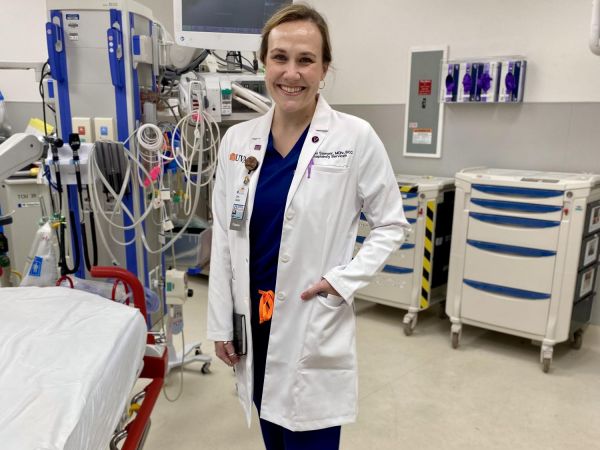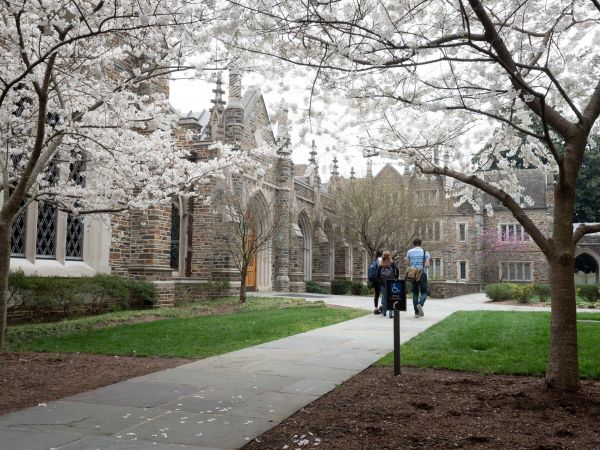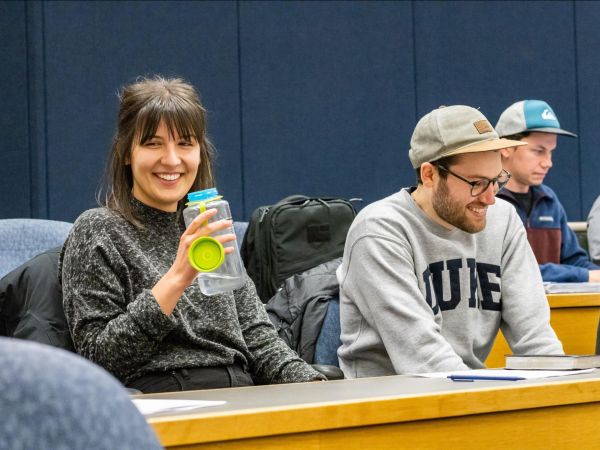The Master of Theological Studies (M.T.S.) degree is tailored to fit the needs of students pursuing advanced doctoral studies or seeking careers in teaching or research. It also provides a strong foundation for students called to serve in lay ministry roles throughout the church, academy, and world. There are two curricular tracks available to students. M.T.S. Core is for those considering a wide variety of applications for their degree (including lay ministry, deacon's orders, nonprofit work, and secondary teaching) and who are seeking an all-around theological education in church history, biblical studies, and theology. M.T.S Focus, which creates greater curricular flexibility, is for students who have already had extensive theological preparation in their undergraduate coursework and who intend to apply for further academic study after completion of the M.T.S.
Graduates have pursued additional degrees at top universities including Baylor University, Boston University, Duke University (Th.D. and Ph.D.), Emory University, Harvard University, Princeton Theological Seminary, University of Notre Dame, University of Virginia, and Yale University. Others have served in lay ministry positions in the church, nonprofit management, academic publishing, counseling, and corporate and government consulting. The degree can also fulfill academic requirements for serving as a deacon in the United Methodist Church.

"The Master of Theological Studies degree program and Theology, Medicine, and Culture Fellowship are equipping me to think theologically in my professional context. I’ve learned to pause and reflect, ask critical questions, and most importantly, consider how systems and decisions may impact those with the least agency and fewest resources."
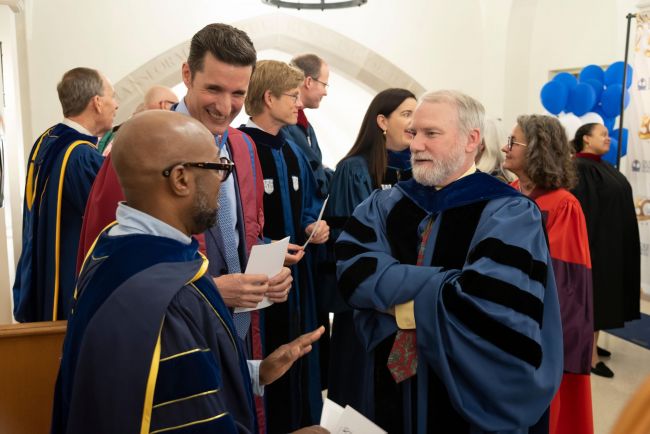
Top Tier Faculty
Our faculty are top scholars in their field and their work is at the cutting edge of research. Duke Divinity School faculty comprise five percent of total Duke University faculty, yet they account for 15% of the publications coming out of Duke University. Students benefit by studying directly with academics who are not only the best at what they do but dedicated to nurturing the next generation of theologians. M.T.S. students work independently with a faculty member to craft their required thesis.

Mentoring for Doctoral Applications
Our M.T.S. degree program is a strong platform for students who plan to pursue further academic work. Our professors mentor students for the doctoral application process, providing support and feedback on research projects and support during the process. The M.T.S. program directors and cohort representatives hold various workshops to assist students in preparing for further graduate work.
Interdisciplinary Opportunities
Within Divinity courses, students have opportunities for in-depth exploration of critical theological issues that face contemporary society. For instance, you can take a class with Project TURN, in which incarcerated men and women study alongside Duke Divinity School students; engage connections between food and faith with Professor Norman Wirzba; discover the intersections of theology and the arts with DITA; explore connections between Christianity and medicine with practicing physicians and theologians. Students can take two classes outside of Divinity School course offerings, taking advantage of our position at the center of a premier research institution with 10 graduate and professional schools.
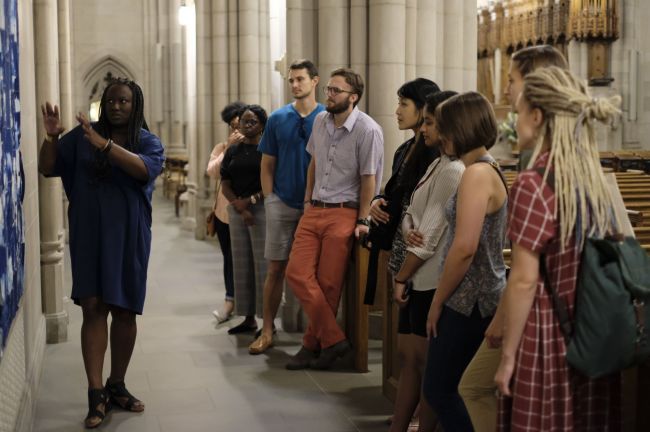
Curriculum
The M.T.S. program features a two-year curriculum that covers foundational areas of history, theology, and Scripture with the flexibility to pursue electives in one's area of interest. Students also complete a thesis under faculty direction during their final year.
The M.T.S Core curriculum requires the completion of 7 core courses and is appropriate for students seeking a wide variety careers, including lay ministry, teaching, and deacon's orders. The M.T.S Focus curriculum allows students with extensive theological preparation in their undergraduate studies to focus their course work in a specific area that aligns with faculty divisions (Historical Studies, Biblical Studies, or Theology and Ethics). For both the M.T.S. Core and M.T.S. Focus programs, students will complete 16 courses and write a thesis.
Graduation Requirements
The Master of Theological Studies program is normally completed in two years. Requirements for graduation are:
- Sixteen courses (M.T.S Core: 7 required courses and 9 electives; M.T.S Focus: 4 required courses and 12 electives) and four or more semesters of residency are required.
- Thesis: Each student is required to write a paper that addresses the learnings or major emphases of the individual's program. The paper will be submitted within a course during the final semester, fulfilling the requirements of both the course and the degree program.
- Student portfolio: All M.T.S. students are required to compile a portfolio consisting of certain papers with faculty feedback and student reflections. The portfolio serves to demonstrate the formation of the student in the areas of exegesis of Christian texts and the ability to think theologically.

Center for Academic Support and Theological Writing
The Divinity School is committed to developing you as a writer. The Center for Writing and Academic Support provides services for writers of all abilities. In addition, we offer the RISE pre-orientation workshop to introduce the fundamentals of theological thought and writing; ongoing academic support workshops throughout the year; and tutors who are available to work with students one-on-one.
Theology, Medicine, and Culture Fellowship
Certificates




Dual Degree Options
An education from Duke Divinity School is worth your investment, and you do not have to figure out the finances alone.
All M.T.S. students receive funding.
Duke Divinity School is investing in you, too. It is an investment in your education, the church, and our shared future. All M.T.S. students receive some form of scholarship support from Duke Divinity School that will cover between 25% and 100% of tuition costs, and there is no separate application needed in order to be considered. Many other internal and external scholarships, as well as federal financial aid in the form of work study and loans, make it possible for students to afford Duke Divinity. FAFSA should be completed for external aid. More information can be found in our Financial Aid section.

Lifelong Dividends
In addition to earning a degree from Duke Divinity School, you also receive benefits that continue to impact your life long after you leave. You will have access to the best academic resources in theological education and will use those tools throughout your career. Theses that are crafted with Duke Divinity faculty members become seeds that may grow into future doctoral projects. By being able to fully participate in a top tier research university, your scholarship can create room for surprising and creative interdisciplinary connections. The overwhelming majority of our students say their investment is worth it.
Ready for the Next Step?
Duke Divinity School accepts applications beginning in September and concluding with our third deadline on April 15. Our admissions requirements include demonstrated program goals commensurate with the M.T.S. degree program, a commitment to some form of diaconal or lay ministry, and a minimum GPA of 3.25 in a bachelor’s degree from a regionally accredited college or university prior to the intended date of enrollment.
Request Info
Join our mailing list, and we'll send you more information.
Request Info about our programsVisit Campus
The best way to learn more about us is to visit. Schedule an in-person or online visit.
Visit Us




